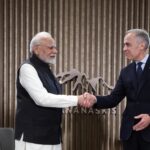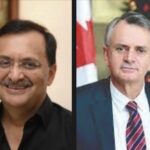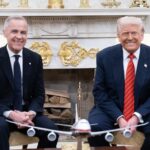New Delhi/Ottawa: After Foreign Minister Anita Indira Anand’s early October visit to India broke the diplomatic ice, the stage is being set for Canadian Prime Minister Mark Carney to accept an invitation from his Indian counterpart, Narendra Modi, to attend the Artificial Intelligence Summit in New Delhi next February.
The move is being described as a genuine effort by both Prime Ministers to mend strained ties and redirect focus toward trade and investment, even as both nations navigate separate tariff disputes with the United States.
India and Canada, which have struggled for years to meet their bilateral trade goal of surpassing $15 billion annually, appear optimistic about reaching the $50 billion mark in the foreseeable future.
In an interview with a leading Canadian newspaper, Indian High Commissioner to Canada Dinesh Patnaik revealed that India has extended a formal invitation to Prime Minister Carney for talks with Modi early in the new year. “If Canada wants to start negotiations, we would be more than happy to speed up things to do it in a fast way. You are looking at a minimum of $50 billion if we allow the proper environment for it,” Patnaik said.
He emphasized the need for renewed engagement at the highest level, adding that India hopes for an early visit by Carney because “it is a relationship we do not want to go downhill.”
A potential visit by Carney could pave the way for a comprehensive economic and free trade partnership — negotiations that have been ongoing for more than 15 years. Free trade discussions had previously reached advanced stages before stalling over disagreements: Canada sought stronger investment security guarantees, while India offered favorable investment conditions backed by infrastructure support.
The two nations last recorded bilateral trade of around $11–12 billion annually until 2024, when the figure rose sharply to $23.6 billion.
Relations between Ottawa and New Delhi soured dramatically in mid-2023 following the assassination of Hardeep Singh Nijjar outside a Sikh temple in Surrey. Then–Prime Minister Justin Trudeau accused the Indian government of involvement in the killing, a claim India strongly denied. The ensuing fallout led to diplomatic expulsions on both sides and a chilling of ties that unsettled the Indo-Canadian community.
The Royal Canadian Mounted Police (RCMP) had alleged links between Indian government agents and criminal activities in Canada, naming Lawrence Bishnoi, who was later declared a terrorist by the new Carney administration.
Recently, both nations appointed new High Commissioners, signaling an intent to normalize diplomatic channels.
Coinciding with this thaw, both India and Canada have found themselves in trade disputes with U.S. President Donald Trump’s administration — a dynamic that could drive the two to deepen economic cooperation.
Patnaik said India is keen to import Canadian oil, gas, nuclear technology, fertilizers, and processed food products, while also seeking collaboration in artificial intelligence and quantum computing.
Before his expected India visit, Carney will embark on a week-long trip across the Indo-Pacific — visiting Malaysia, Singapore, and South Korea from October 24 to November 1, 2025 — to strengthen trade and defense partnerships.
In announcing the trip, Carney noted that Canada’s new government aims to diversify its trade portfolio amid shifting global dynamics. “In the face of this upheaval, Canada’s new government is focused on transforming our economy from one that is reliant on a single trade partner to one that is stronger and more resilient to global shocks,” he said.






